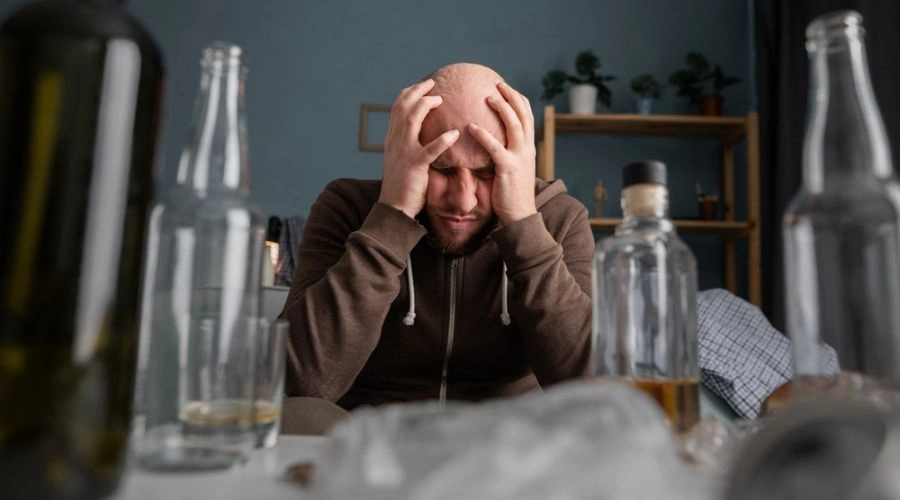Know The Connection Between Alcoholism And Bipolar
There is no sugar coating the reality that living with a bipolar alcoholic is a challenge.
Watching someone you love suffer from the mood swings of bipolar disorder, combined with the self destruction of alcohol use disorder, is not only emotionally painful and traumatic but creates a volatile home environment that can be downright dangerous.
Still, as hard as it is to manage living with someone under such conditions, understanding the connection between these two conditions is the foundation for being patient, showing up, and finding the right rehab facilities for them to get help for both bipolar and excessive drinking.
The real answers in terms of how to live with a bipolar alcoholic arrive in the form of minimizing risks and managing expectations, at least until they are willing to get help.
Our blog post from Ingrained Recovery will break down the biggest dangers faced by someone experiencing alcohol abuse alongside bipolar symptoms, and shows the path to helping them find practical treatment options as well.
Get Proven Detox And Rehab Options Now!
Find Help At Ingrained Recovery
The Basics on Bipolar Disorder and Alcohol Use Disorder
Studies show that those with bipolar disorder are more likely to have a substance use disorder than those without a mental illness. Combining alcohol use disorder and bipolar disorder makes both conditions worse.
Approaching these situations with care and expertise through the lens of dual diagnosis treatment is the stepping stone to long term recovery.
If you’re living with bipolar disorder alone then you know how important it is to have a strong support system, access to a compassionate care team and to stay proactive. There are no solutions found through alcohol.
While some users find temporary relief from depression, the long term outcome is only complicated further by the dangers of alcohol abuse and co occurring bipolar disorder.
How is Bipolar Disorder Defined Among Mental Disorders?

Bipolar disorder is a complex mix of fluctuating mental health symptoms leaving those who suffer with feelings of mania that quickly switch to intense depression. In fact bipolar disorder is also known as manic depression, highlighting the two extremes.
Manic Episodes
Mania or a manic episode is characterized by episodes of extreme happiness and increased energy often accompanied by impulsive behavior. These can last from a few hours to several days before switching rapidly and unexpectedly to severe depressive episodes.
Depressive Episodes
The happiness and energy from a manic episode is replaced by severe depression. Users often feel hopeless, fatigued and overwhelmed with intense sadness. It’s common for those in a depressive episode to sleep in bed for days.
Those who are undiagnosed or do not seek out treatment can face a decline in quality of life quickly. The situation often gets even more dire when combined with an alcohol use disorder, adding another layer of volatility.
What Makes Up a Diagnosable Alcohol Use Disorder?
Having an alcohol use disorder is one of the most common forms of substance abuse in the US. It’s characterized by the need to consume alcohol to combat the intense withdrawal symptoms during the detox period.
Those with alcoholism often, but not always, display the following signs:
- Drinking alone
- Neglecting personal hygiene
- Ignoring responsibilities
- Becoming distant from family and friends
- Intense withdrawal symptoms without alcohol
The Connection Between Bipolar Disorder and Alcoholism

The toll on your mental health when you have bipolar disorder is amplified when combined with alcoholism. Users find they can numb the emotional pain from bipolar disorder by being drunk.
But when alcohol is added, feelings of loneliness and sadness can quickly turn to rage from the unpredictability of daily drinking.
Any mood swings are intensified making it even harder to manage safely. Studies show that about 40% of those with bipolar disorder also have some form of substance abuse issue.
And treating a substance use disorder alongside mental health disorders requires a specific type of care called dual diagnosis treatment. To treat bipolar disorder and alcoholism you must understand the dynamics between these two mental and behavioral illnesses.
Get Accredited Treatment at Ingrained
Find Help At Ingrained Recovery
Living with Someone Who Has Bipolar Disorder and Alcoholism
Supporting the ups and downs of life with someone who has bipolar disorder and alcoholism together drains anyone and everyone in the household. Mood swings are perpetuated by the unpredictable, aggressive episodes of intoxication from constant drinking.
Common signs include random outbursts of anger, impulsive behavior, physical aggression and even self harm. The violence that takes over the living situation makes it hard for loved ones to deal with these co-occurring issues.
The smallest, most trivial thing can trigger a bipolar alcoholic to explode without warning. This is a clear mental and physical danger to anyone living under the same roof. Domestic violence is common and leads to encounters with law enforcement.
At Ingrained Recovery our staff is made up of clinicians and others with experience in providing effective treatment for clients with dual diagnoses. We have a detox program that can be followed up with our top-notch inpatient treatment making us the perfect option for those seeking support.
The Damage of Severe Depression, Mania, and Alcohol Abuse
What kind of damage is done from living with a bipolar alcoholic? The impulsive behavior that comes with drug and alcohol abuse combined with the mental health challenges of bipolar disorder can lead to:
- Unnecessary spending. Unexpected financial difficulties from unnecessary spending puts strain on the household. Arguments over financial shortfalls quickly turn violent and often become a trigger for domestic violence situations.
- Impact on family. Living with a bipolar alcoholic can lead to loved ones experiencing depression themselves. The stress and anxiety can quickly burden them making everyday life for them almost impossible.
- Physical risk. Living in a potentially violent situation is a physical risk to anyone in the home. Not only are loved ones at risk if the user becomes violent but self harm can become a major risk. Injury risks come from drunk driving, self mutilation and general disregard for personal safety.
Despite how hopeless you may feel right now, there are some strategies that can help. The experts at Ingrained Recovery recommend the following to counteract the unpredictability of alcohol use disorder and manic depression.
How to Support a Loved One Through Bipolar Episodes

We understand that helping a bipolar loved one stay sober amid struggles with bipolar may seem like a daunting task, but there are solid strategies for such a situation.
The foundational part of this process is to educate yourself on addiction, depression and manic episodes. Learning about what happens during addiction and mental illness can help you understand what your loved one is going through and how to support their recovery.
Support Through Communication
Sometimes those with depression just want to feel heard. Keeping communication open can lead to real conversations. Use these opportunities to show empathy and voice your concern without judgment.
By keeping lines of communication open you can prevent explosive situations by unloading all your feelings during a tirade that gets nowhere.
This simple communication plan can help the user recognize the need for professional treatment. You must be careful during your intervention approach and foster your concerns over a long period.
Straightforward actions can set the stage for the user to recognize that professional treatment is needed to treat these disorders.
But don’t forget to set boundaries. Not enabling destructive behavior is a lifesaving response to addiction. Making excuses for their behavior or offering financial help to fund a drinking habit only makes things worse.
Encourage Them to Get Effective Treatment
Encouraging a loved one to get treatment is also vital. Alcohol abuse and bipolar disorder both can be treated effectively with professional therapy, mood stabilizers and certain antidepressants.
Ingrained Recovery has several programs to help your loved one manage withdrawal and get the personalized care needed to succeed in sobriety.
Up To 100% of Rehab Covered By Insurance
Find Help At Ingrained Recovery
Get Your Loved One Help for Drinking and Bipolar Today
At Ingrained Recovery we offer our clients a two step solution to support all of their recovery. The first leg of the journey is detox. You receive 24/7 medical care, you are under constant supervision. Our clinicians can also prescribe medication to help with withdrawal symptoms.
Following detox, our inpatient program provides the structure needed to maintain the discipline to avoid drinking during the early days.
Don’t keep struggling day after day. Get help for both yourself and your loved one and contact us today for top notch help. Our admissions team can help you with the insurance process and answer any questions you may have about our facility so please call us confidentially now.

